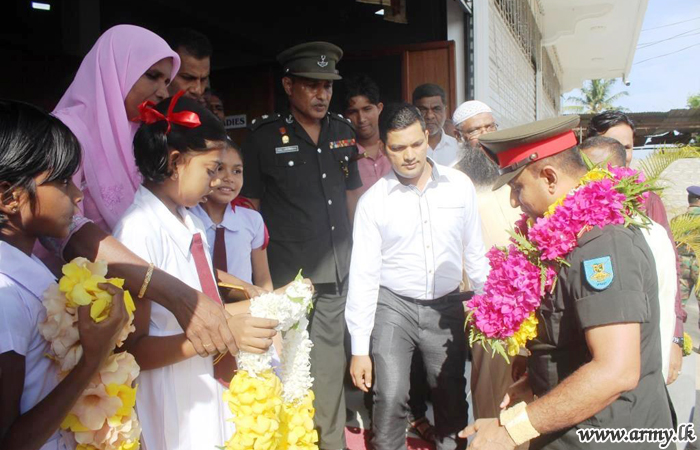.png)
Graphic by Sri Lanka Campaign for Peace and Justice
The militarisation of the education sector in the North-East “raises important questions about the risks posed to child welfare” and wider implications for economic development says the Sri Lanka Campaign for Peace and Justice.
“Drawing on insights from Tamil activists working in the North and East, we find evidence that this engagement is perceived as a means of social control and surveillance by war affected communities, with the focus on children seemingly designed to help entrench and normalise wider patterns of militarisation,” they said.
Since the end of the armed conflict in 2009, there has been an increase in military presence across the North-East, with soldiers becoming increasingly involved in school activities with “disturbing frequency,” the report states.

“Among the most obvious explanation for the disproportionate frequency of army interactions with school children in the North and East, is the fact that the overall presence of the military in these areas is itself highly disproportionate. Eleven years after the war ended, these war-affected provinces retain alarmingly high levels of militarisation. For example, 14 of 21 of the Sri Lankan Army’s divisions are today stationed in the Northern Province,” it added.
Impunity for Human Rights Violations: A Risk to Child Welfare?
“In assessing the army’s presence in educational settings in Sri Lanka, consideration also needs to be given to its wider implications for child welfare.”
There has not been any accountability for grave human rights violations committed by Sri Lankan soldiers against Tamil civilians, including children, during the war.
“But the problem of impunity in the Sri Lankan army extends beyond crimes committed during the war. In 2007, over 100 Sri Lankan peacekeepers were identified as being part of a child sex ring that operated for three years during a UN peacekeeping mission in Haiti. Although most of the accused were repatriated by the Sri Lankan government, none were criminally prosecuted.”
“This deeply rooted pattern of impunity for crimes against children- and against members of the Tamil community specifically- raises serious questions about the risks to child welfare associated with regular interactions between army troops and children in the North and East,” the report highlighted.
Restricting Economic Recovery
There has also been an increase in the involvement of the military in a “wide range of economic activities and appears to have no plan to return these to civilian control.”
“For example, a 2018 report on the military’s involvement in the tourism sector found that ‘businesses run by the military…are staffed by their own personnel, directly unseating potential livelihood opportunities…The loss of livelihood and profits experienced in the tourism sector will also be experienced by the numerous other sectors within which the military is conducting business.’”
“An important question that therefore arises here is whether army’s role in constructing and maintaining schools could be denying employment opportunities to local people. The army does not appear to be as involved in these roles outside of the North and East, where the private sector generally carries out these tasks.”
Read the full report here.
